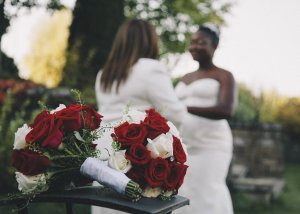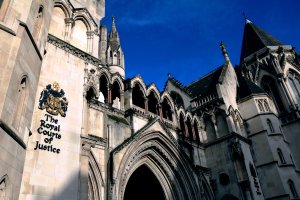Wedding law in England and Wales is badly out of date.
We campaign for marriage to be equally open to all, regardless of religion or belief.
Time for one wedding law for all.
In England and Wales, different laws apply depending on whether a wedding is Anglican, Jewish, Quaker, another religion or not religious at all (a civil wedding or partnership).
This is unfair, confusing and absurd.
Most religious weddings must be held in a registered place of worship, while civil weddings and partnerships must take place in approved premises. Jewish and Quaker weddings can take place anywhere.
This system leads to inequality. Members of religions which don't have fixed places of worship, or don't use their places of worship for weddings, are disadvantaged. And members of nonreligious communities such as Humanism have no way of getting legally married according to their philosophical beliefs.
The process for a place of worship to register itself for marriage is much cheaper than for approved premises for civil ceremonies. This in turn contributes to the cost of civil marriages and partnerships.
Over 80% of opposite-sex marriages in England and Wales in 2019 were civil marriages. But only 16% of recognised wedding venues in England and Wales can hold civil marriages. The remaining 84% are religious venues.
While approved premises for civil weddings and partnerships must by law hold ceremonies for same-sex couples, this is not the case for places of worship. In 2022, only 2% of places of worship were registered for same-sex weddings. This considerably reduces the options for same-sex couples. Whereas opposite-sex weddings are in slow decline, same-sex weddings are increasing.
UPDATE: The Law Commission has now made its final recommendations on reforming wedding law on England and Wales. Please write to your MP in support of the recommendations...
Unregistered religion-only 'marriages'
The complexity of marriage law may contribute to the rise in couples who have religious 'wedding' ceremonies that are not legally-binding.
A signification proportion of Muslim couples are in an Islamic 'nikah' union lacking the full legal rights and protections of a recognised marriage.
Unregistered marriages can undermine women's rights in particular. If a woman in a nikah is 'divorced' suddenly, or against her wishes, she can be left homeless and without any money or assets.
The situation is made worse by sharia councils or 'courts' which dispense religious rulings on Islamic marriage, child custody and divorce. These are not courts of law but there are concerns some Muslim women, especially those not born in the UK or unable to speak English, perceive them as having real legal authority.
Sharia councils leave children vulnerable and discriminate openly against women. To seek a religious divorce a woman must gain permission from these almost entirely male councils, and there are reports of women being denied this request even in cases where they have faced abuse.
Reforming wedding laws will not solve these problems completely. But making wedding laws simpler and fairer can encourage couples to gain the legal protections of a registered marriage.
Take action!
1. Write to your MP
Tell your MP to support the Law Commission's recommendations for wedding reform.
2. Share your story
Tell us why you support this campaign, and how you are personally affected by the issue. You can also let us know if you would like assistance with a particular issue.
3. Join the National Secular Society
Become a member of the National Secular Society today! Together, we can separate religion and state for greater freedom and fairness.
Latest updates
Don’t extend exemptions on same-sex marriage in NI, NSS warns
Posted: Thu, 5 Mar 2020 14:29
The National Secular Society has warned the government that allowing providers of wedding services to opt out of serving same-sex couples in Northern Ireland would seriously undermine equality law.
Same-sex marriage has been legally recognised in Northern Ireland since 13 January after the UK parliament backed its legalisation last year.
The government is now consulting on issues such as whether certain religious bodies will be able to opt out of offering same-sex marriages.
Ministers currently propose to add in exceptions to current discrimination law so it is not unlawful for officiants to refuse to solemnise same-sex marriages.
The Presbyterian Church in Ireland is calling for exemptions to be extended further to include Christian owned businesses such as hoteliers, wedding photographers and florists who do not wish to provide services to same-sex couples.
This call has been echoed by the DUP. The party's spokesperson Sir Jeffrey Donaldson has argued for "protections for people such as civil registrars and others who have a high level of involvement in local marriages and stand to be disproportionately impacted by the change in law".
The NSS has now written to the government to highlight the dangerous impact any additional exemptions would have on UK equality law.
In a letter to the secretary of state for Northern Ireland, Brandon Lewis MP, the NSS argued that any weakening of discrimination would undermine the equal citizenship of gay and lesbian individuals.
NSS chief executive Stephen Evans said: "The government needs to look very carefully at this consultation and ensure the legislation it puts in place protects the rights and dignity of same-sex couples in Northern Ireland.
"Calls to water-down anti-discrimination laws should be given short shrift. If we start saying civil registrars, or even florists, can refuse to serve same-sex couples, then we will create a damaging hierarchy of rights in society.
"In the name of equality, refusing such demands for a 'conscience exemption' is legitimate, desirable and fully compatible with the European Convention on Human Rights."
This debate on this issue highlights a deeper issue of the entanglement of religion and state in the legal institution of marriage. The lack of separation has resulted in significant complexity in the laws that govern marriage throughout the UK.
Image by briannad26 from Pixabay.
Islamic marriage invalid under English law, court rules
Posted: Thu, 20 Feb 2020 13:28
A ruling that a Muslim 'marriage' was void rather than a non-marriage has been overturned at the Court of Appeal.
The court has said Nasreen Akhter and Mohammed Shabaz Khan, who had an Islamic 'nikah' wedding ceremony in 1998 but no civil ceremony, did not have a legally valid marriage.
The couple, who separated in 2016 and have four children, both knew the nikah ceremony had no legal effect and intended to follow it with a civil ceremony.
The original ruling in 2018 entitled Akhter to a decree of nullity, which rules a marriage void and entitles parties to financial protections under civil law.
That ruling was partly based on the fact the couple held themselves out to the world at large as husband and wife and that their vows had similar expectations to British marriage contracts.
But the appeal court found the nikah was a non-qualifying ceremony and the partners were not marrying under the provisions of English law.
It noted that the ceremony was not performed in a registered building, no notice had been given to the superintendent registrar and no certificates had been issued.
The National Secular Society campaigns for religion to be separated from marriage law and encourages efforts to promote greater awareness of what constitutes a legal marriage in religious minority communities.
NSS chief executive Stephen Evans said: "This ruling again highlights the need for comprehensive reform of England and Wales's archaic marriage laws to make the process of marriage clear, fair and consistent for all.
"As an institution with serious legal implications, the civil act of marriage should follow a secular process. Couples should be free to hold whatever religious or secular ceremonies they want immediately before or after the formal civil registration moment, but no religious ceremony in and of itself should have legal implications.
"What determines a marriage's legal status should be the registration process, and not the building where it takes place."
The Law Commission is currently reviewing the marriage laws in England and Wales.
Image by Steve Brown from Pixabay.




